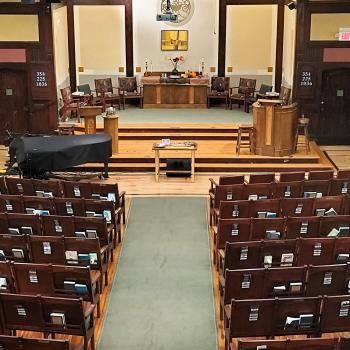As a minister, my task is often to put events of the world into a theological context, by which I mean finding a way to connect what is happening around me to values and stories – my own and my communities’. Another way to say this would be the work of making meaning. And so I find myself today with the task of making meaning in the whirlwind that is happening within Unitarian Universalism with regard to our structures that benefit white people over people of color.
There is so much to be said about what, exactly, is happening, and I strongly encourage Unitarian Universalists to read much of this directly, but here is a bit of a summary. On March 23, the Unitarian Universalist Association (UUA) announced the hiring of a white person as the new Regional Lead in the Southern Region. For those unfamiliar with the UUA staffing structure – most of the world! – we have staff at our national headquarters in Boston, and then we have staff in 5 regions of the country. Regional Leads are the heads of these five regional staff groups, and it is a position of significant responsibility and authority. This hiring decision continued the status quo that all 5 regional leads are white. This decision occasioned a conversation about the racial make-up of UUA paid staff. For a good summary of the issues involved, see this post from Black Lives of UU, which notes that the highest levels of paid staffing at the UUA are overwhelmingly white.
Aisha Hauser, a Seattle based religious educator, raised this issue with the President of the UUA, Peter Morales, and then with the UUA Board in this open letter. Subsequently, Christina Rivera came forward to disclose that she was also a finalist for the Regional Lead job, and described her experience of not getting the job, and being told it was an issue of “fit.” Here are her words.
The President of the UUA initially responded to the raising of these concerns in a letter that many found dismissive, in which he said among other things, “None of us is above criticism. Each of us should be accountable. However, I wish I were seeing more humility and less self-righteousness, more thoughtfulness and less hysteria.” Those who had brought these issues forward in thoughtful ways found this statement deeply painful and offensive, and this occasioned a whole new level of anger and many more public posts by various people. (See here for a collection of the various statements as this has all unfolded.) Three days later, Peter Morales wrote to the UUA Board resigning as President of the Association.
After Morales
In the midst of all of this, here I am, trying to make meaning. As a Unitarian Universalist, I am committed to the seven Principles of Unitarian Universalism including: the inherent worth and dignity of every person; justice, equity, and compassion in human relations; the right of conscience; the goal of world community with peace, liberty, and justice for all.
From this perspective I can say that our current systems and structures are clearly failing to treat all people in ways which honor their dignity and worth. We are clearly falling down on the responsibility to create systems which embody justice and equity. I am grateful to the courageous voices raised in acts of conscience to bring all of this so clearly to our collective attention.
As a group of UU ministers of color said in an open letter to the UUA Board: “there exists within UUism institution-wide patterns of behavior – including formal and informal power brokering, coded-language and communication, and well-entrenched patterns related to hiring and call – that favor those who look and act like the majority white culture within Unitarian Universalism while creating disadvantages for those who do not. This is particularly true for compensated employment opportunities, and especially so for the higher level, higher profile paid positions.”
From the standpoint of the Principles, I can say, we have clearly fallen short of these Principles, and we need a renewal of our commitment to embodying them. I think that part of our problem has to do with what we are willing to look at and consider, and what we are not paying attention to. Thank you to Jake Morrill for drawing my attention to the relevant executive limitation guiding hiring:
“[The President of the UUA may not] Fail to promote the full participation of persons in all UUA activities, UUA employment… without regard to race, color, sex, disability, affectional or sexual orientation, gender identity, age, or national origin…”
I have to say that I don’t think we are being well served by framing our quest for just hiring in the language of “without regard to” various ways that people can be different. I think this is an approach which aims at colorblindness, and we can all see how well that is working – it’s not. I think the issue is that this allows us to imagine that we are not seeing race or other dimensions of human difference in hiring practices, or that we are treating everyone the same. This masks the ways we are making decisions based on both conscious and unconscious bias about deeper dimensions of cultural difference, which are being swept into the very opaque realm of “the right fit.”
I think we actually do need to have regard for race, color, and other dimensions of human difference in hiring. I think that is exactly the point. We cannot ensure a diverse group of paid staff leaders unless we have that as a goal. Following the lead of Aisha Hauser, I very much support the goal of increasing the people of color in upper level management at the UUA by 25 percent by 2019. We can only do this if we try, if we recognize that there is value in having more perspectives at the table, that we might learn something and grow in ways we can’t imagine – that we might actually be able to better embody our Principles – if we get serious about both hiring people of color into positions of significant power and authority, and then actually follow in the direction they seek to lead us.
Contexts
I can see a way to put this into the context of Unitarian Universalist value commitments, and I am grateful to all the many people, those I’ve linked to in this piece and others, who are helping in the work of making meaning of this moment in Unitarian Universalism from the perspective of UU Principles and values.
What I am having a harder time with is putting this into a Pagan theological context. I am struggling to find a way to think or talk or experience all of this in relation to “the nature path,” to quote the name of this blog. So, I want to end with an invitation that we might consider that together. How does all of this relate to Paganism? What are the stories, values, experiences, rituals, etc. that might help us collectively make meaning in this moment of turmoil for Unitarian Universalism? I would very much welcome your thoughts in the comments.


















